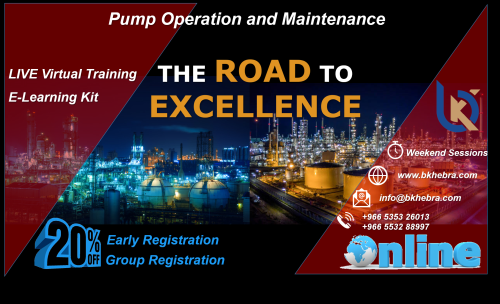| Training Code | Date | Duration | Venue | Fees |
|---|---|---|---|---|
| Keep following, we are updating our training schedules. | ||||

Pumps are at the heart of most industrial processes, and the second most common machine in the world. Because they are so common, pumps are often overlooked as a potential source of improved productivity, or a cause of excess costs if not operated properly. Plant managers, maintenance engineers and production supervisors should adhere to best practices and understand the operational dos and don’ts for employing pumps properly in manufacturing and industrial applications. This white paper provides an overview of how to operate pumps properly and the performance parameters that need to be monitored in a preventive or predictive monitoring program. It also describes continuous monitoring systems, with several case studies on how they can be applied to improve system performance and reduce maintenance costs.
In this 5-days B. Khebra’s Pump Operation and Maintenance training program will provide a refreshment of knowledge for the how both of them concepts and how it works and what are main problems facing it during operations of them. Also, it will provide a solid foundation for technologists moving into a machine monitoring and diagnostic role. The course will also give a detailed advanced treatment of the detection, location and diagnosis of faults and failures in Pumps. Case study and examples are used throughout the course to emphasize key points and to underline the relevance and applicability of the topics being addressed.
This course aims to convey the latest thinking and best practice of Rotating Equipment Machinery Components Especially Pumps which we consider it the important types of Rotating Equipment’s, also will explain to the participants about conditions monitoring and analysis via lectures, case studies, video films and course activities.
Upon successful completion of this course, the delegates will be able to:
This course is valuable for Plant operations, maintenance personnel, plant engineering managers and supervisors working in power, chemical, oil and gas, petrochemical and other industries. Those who did not have previous formal training will find this course very useful in improving their knowledge and confidence in pumps operation and maintenance. Those with previous pumps training may find it a good refresher and may learn some important information not covered in their earlier training.
On successful completion of this training course, BK’s Certificate with eligible Continuing Professional Education credits (CPE), will be awarded to the delegates , one CPE credit is granted per 50 minutes of attendance.